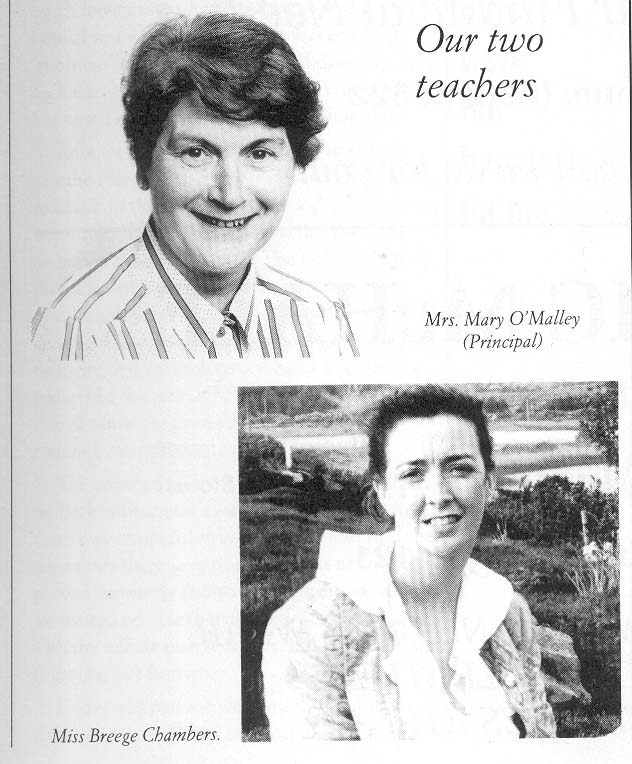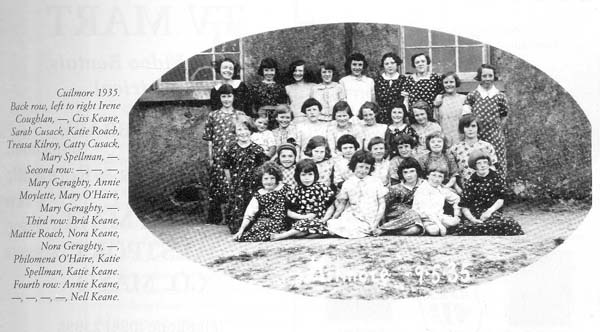
BEFORE the era of bicycles, buses and cars, pupils walked to school. The advantages of having to do this, I think, was the fact that we were closer to nature; now whether this was appreciated at the time is debatable but on reflection the experiences were memorable.
The walk from our house to end of the road was done with real purpose. There we met the Durkins and from there, feet began to drag as yesterday's news was reiterated. During the winter months however our pace accelerated, perhaps because of the biting cold and also because we rushed to break as much ice on the potholes as we could. At this time of year too gloves were swapped and fingertips massaged to promote the circulation. Wetontinued our journey until we got to Joyces step -there we waited for the Keane's as they negotiated the hill known as "Joyces Molly". This hilly field was a short-'cut for them. We then waited for the Heneghans from Brockagh and all walked together continuing the banter until we reached Geraghtys. As they lived by the roadside the stop there was short.

Now the narrow road could hardly cope with the influx of pupils so the girls walked at the front and boys brought up the rear. We then reached the 'top' of Cortoon Road, there we joinedfor<:es with the Geraghtys, the Sammons and the Feeneys. Now progress was at a minimum until we got to the top of the' Ally' and suddenly on seeing the school we reali'ied that we weren't on a nature walk and began to quicken our pace as if there was a definite goal to achieve.
Now the journey home was a different matter - with the seat of learning only a memory we trudged aimlessly along; I am sure Croagh PatrIck was often conquered at a brisker pace. Each stpry being related was given full ear and usually a 'standing ovation'; sometimes there were debates, disputes, and the odd punch-up but mostly these were short-lived. Again the girls wereto the fore and sometimes one of the boys would sneak up on us and try to trip one of us whereupon there was consternation within the ranks and he was denounced as a brat.
Somehow the summers seemed to be so much nicer then with endless sunshine and those of us brave enough to remove our sandles walked in the bubbling tar and then tried in vain to clean the black mess on the grass. When we got home we had to endure a lengthy lecture on behaviour an this was often accompanied by a good 'thump'. Now the lizards pond was a place held in awe by the younger children and the older ones always said that it was bottomless and he who dared perished. But despite the lectures we often ventured onto the edge to get at the frog spawn and many times we were chased by the boys carrying same and threatening to throw it on us.

'Short-cuts' were the norm back then but contrary to what a person would believe it took much longer to walk these than to take the regular route. Joyces mountain was one such 'short-cut' and how many times did we slip off a rock into a big puddle and endured the squelching sound of wet feet in sodden wellingtons.
Another one of those so-called faster lanes was the village. This ran parallel to Cortoon road and in the summer we got a drink of spring water from Pakies well -oh did this taste like nectar on a parched palate. The only thing'that dissuaded us from taking this roue was Pakies dog, an animal whose reputation preceded him and should he be sighted there was no time for dalliance and we took to our heels like the proverbial 'bat out of hell'. Once we were at a safe distance the pace slowed again and we resumed the conversation.
The cover provided by a whitethorn hedge on Batleys Brae was a safe haven for birds and there was competition as to who would find the most nests there in springtime. This area also proved extremely fruitful in the autumn when we feasted on blackberries and went out way with the telltale purple dye on lips and fingertips betraying our festivities.
Friday was pension day and those of us who didn't have to collect a pension for relatives or neighbours accompanied those who had, to Doherty's Post Office. We then either went up at Mastesons or back Cuillentra boreen. On the latter route there was another diversion this being Murrays orchard, a place frequently visited in season and right now I can almost feel the goose pimples when I think of us grimacing as we bit into a sour apple. We then continued along and followed a narrow path th,roUgh Sheridans field and back on to 'terra firma.'
The art of conversation was very much alive then because everyone we encountered on the road we chatted to, and the older folk enjoyed learning the snippets of information from the pupils, some of which was greatly exaggerated I imagine. Of course we didn't have any grey areas then either everything was black or white.
I never thought when I put pen to paper that it would evoke so many memories for me. I can't honestly say that school days were the happiest for me but certainly the journey there and back was a revelation in itself. The only damper of my reflections is the fact that so many of my friends and acquaintances have had to emigrate and also a few who have died at a very young age, and lastly I never thought that when I yelled at my own children for coming in late from school that they would be able to read of my exploits and question my credibility.